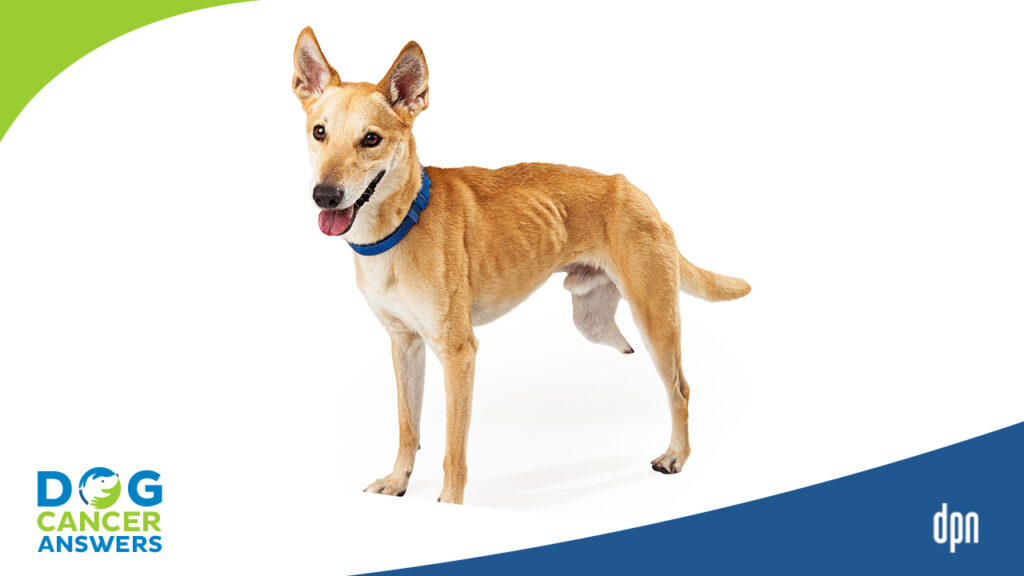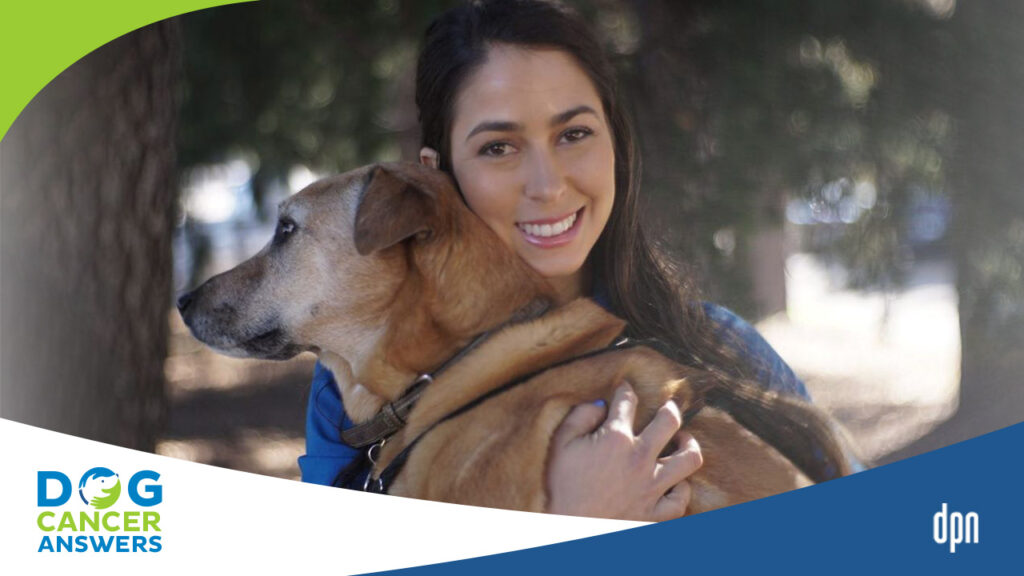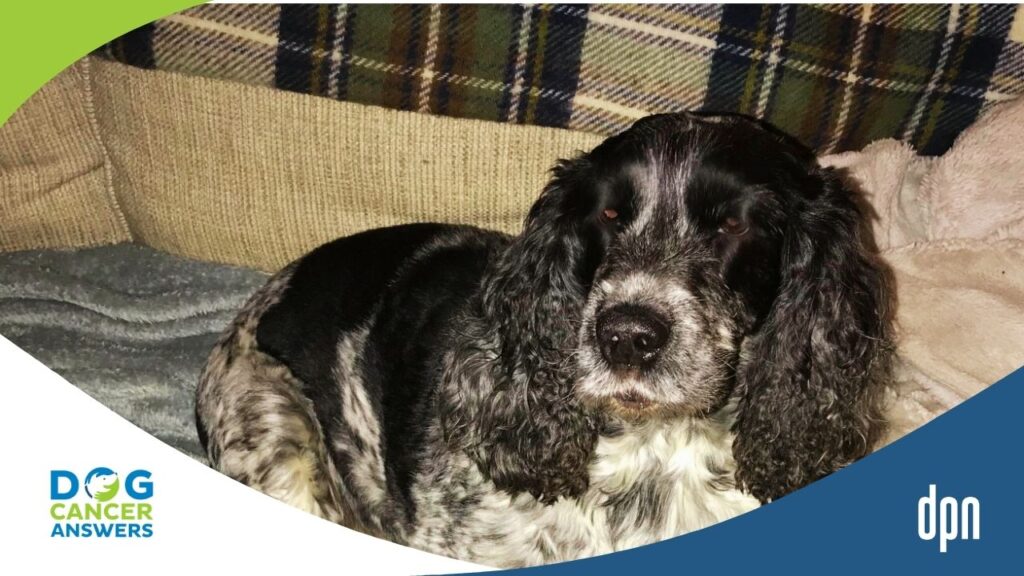EPISODE 114 | RELEASED March 29, 2021
Dog Bone Cancer – Symptoms & Amputation & Treatments | Dr. Demian Dressler Q&A
Bone cancer is aggressive and painful, and by the time it’s diagnosed, it’s usually well-established. Veterinarians often push for amputation quickly, which tends to spin our heads around. Dr. Dressler explains why they don’t typically wait for a biopsy.
SHOW NOTES
A reader asks why his veterinarian didn’t wait for a biopsy before suggesting amputation for his dog’s cancer. Dr. Demian Dressler explains why that probably was. The discussion that ensues covers a wide range of topics related to osteosarcoma and other bone cancers.
This plain-language episode is a must-listen for anyone ready to hear the hard truths about bone cancer, how it arises, how it’s treated, and why it’s so painful.
And there’s hope, too – because relieving pain is possible, and that helps so much. Longevity is absolutely possible, especially when we actively address quality of life.
Dr. Demian Dressler is the author of today’s sponsor, The Dog Cancer Survival Guide: Full Spectrum Treatments to Optimize Your Dog’s Life Quality and Longevity.
Tripawds is a fantastic resource for anyone facing osteosarcoma, bone cancer, and amputation: Help for Three Legged Dogs and Cats (tripawds.org)
>> Dr. Demian Dressler: [00:00:05] They’ll be doing their own PT, their own physical therapy because usually these bone cancers are painful. And they’ll usually be supporting more weight on those other three legs. So they’ll be doing their own pre-surgical therapy, as they hop around on three legs.
>> Announcer: [00:00:19] Welcome to Dog Cancer Answers, where we help you help your dog with cancer.
Here’s your host, James Jacobson.
>> James Jacobson: [00:00:28] Hello, friend. Today, we’re sitting down with Dr. Demian Dressler to talk about one of the most aggressive dog cancers. It’s called osteosarcoma, and it is a tough diagnosis to deal with, as anyone who’s facing bone cancer will tell you. And, because it’s often treated without getting an official biopsy upfront, sometimes people have trouble wrapping their mind around the situation at first. So today we are going to do a good high level overview based on a really common question that we get here at Dog Cancer Answers. And that is why did my veterinarian suggest amputation before even doing a biopsy for bone cancer for osteosarcoma. Dr. Dressler, thanks again for being with us today.
>> Dr. Demian Dressler: [00:01:19] Oh, you’re welcome. Pleasure being here.
>> James Jacobson: [00:01:20] Let’s talk a little bit about bone cancer. A question that we have right here is why didn’t my vet do a biopsy on my dog’s bone cancer.
>> Dr. Demian Dressler: [00:01:30] Well, it’s a fair enough question. Sometimes the changes that you see in an X-ray are so typical that the odds of it not being that are going to be so low, particularly if you’re doing an additional workup where you looking for the other things that may be, it could be, and you don’t see anything that would support something different. I mean, the main other things are going to be bone infection, bacterial or fungal.
Those are going to be your main other considerations. And there are cases where there’s absolutely no travel history that would support fungal bone infection, or the geography doesn’t support it, cause those things only occur in certain locations. There’s absolutely no clinical signs or laboratory signs that would suggest bone infection.
The x-ray appearance is so typically classic that you can make your diagnosis with about a 99% certainty that that is the case. Now you’ve also got other circumstances where maybe you want to take a bone biopsy. So why don’t you just do that across the board? Well, because you’re putting a big needle in a weak bone, and if you do that, and that bone is already prone to pathological fracture, you just made a big hole in it with your biopsy needle, which is yes, what you have to do to get your specimen. It’s possible the vet was also concerned about your dog breaking his leg after the procedure. And sometimes they’ll break their leg anyway, because they’ve got a tumor in there, and the leg is already weak.
So there are some cases where appropriate clinical judgment would be, don’t break the dog’s leg.
>> James Jacobson: [00:03:08] Is amputation the only solution for bone cancer, for osteosarcoma.
>> Dr. Demian Dressler: [00:03:12] Well, the word solution I have a problem with because, we’re talking about malignant cancer. And we’re talking about the time when you’ve got the cancer diagnosis with osteosarcoma about 98, 96% of those have already spread elsewhere in the body.
That means that you take the leg off and there’s cancer cells elsewhere in the body, whether or not you can see them on an x-ray or using other tools. So I’m not quite sure what the “solution” word, it is actually referring to. Because it seems to be based on an incorrect assumption that by amputating the leg to cancer is going to be gone.
And the majority of the time that’s simply false. So I’m not sure if I’m actually answering that question, but
>> James Jacobson: [00:03:50] I think what this question is asking is like, if I have osteosarcoma, do I have to do amputation? Is that really the only thing? Or then they use the word solution, but is that the best and only course?
>> Dr. Demian Dressler: [00:04:04] No. These are all guardianship decisions. Like there’s guardians out there who, with a diagnosis like that would be, well, I’m not going to move forward, because the survival metrics on this are not what I want for my dog, or there’s going to be also cases where you’ve got, you know, a 16 year old, 18 year old dog or something.
And maybe you don’t want to put them through that.
>> James Jacobson: [00:04:26] Yeah.
>> Dr. Demian Dressler: [00:04:27] These are all correct treatment decisions. It’s not like amputation is a correct or an incorrect treatment decision. It’s just a way of reducing cancer cell burden in the body. So that the, again, the dog doesn’t break its leg, after a while. What happens with these tumors is they’re fairly resistant chemotherapy by the way, more or less, I mean, certainly, from what most people would expect. You know, you look at the best possible outcomes on these guys and the median survival time with the fanciest chemos and everything. And, well, if you don’t consider immunotherapy and other aspects of comprehensive cancer care, but if you’re looking at conventional care, you know, nine, 10 months or something is median survival time with these cancers.
>> James Jacobson: [00:05:07] And that’s after surgery
>> Dr. Demian Dressler: [00:05:08] Right, and chemo, By the way.
>> James Jacobson: [00:05:10] Right? So the chemo isn’t that effective even after the surgery?
>> Dr. Demian Dressler: [00:05:14] Well, again, it depends on what your definition of effective is. If you’re talking to an oncologist, they’ll be like, Oh yeah, that’s effective. For me personally, I don’t think it’s very effective.
>> James Jacobson: [00:05:24] And just remind our listeners why an oncologist would say It is, because they have a different perspective on effect.
>> Dr. Demian Dressler: [00:05:30] Well, because the first thing is you’ve got to realize is that dog lives are compacted compared to human lives, right? So everything has shrunk. So if your average human lives say in this country, something like 75, 78 years give or take, and then your average, say medium size dog lives, 12 years give or take, well then an increase in the survival time of a year for a 12 year old dog, that’s 8% of their life.
And you know, that that translates into a pretty good chunk of time for a human being. 8% of your life. Right? The second thing to understand is that oncologists deal with cancer all the time. So if you’ve got a multi-year remission for a cancer, that’s like an astonishing success for them because of the fact that, that, the tools that we have available are not, are, I think underwhelming relative to what most guardians would prefer for dealing with their pet sickness, you know, and you look at the most treatable cancers using standard chemotherapy agents, 12, 14 months, median survival time on those guys, if you take 50 dogs that are all treated with it, half of those dogs are going to be gone between 12 and 14 months of age with the most chemo sensitive cancer.
So it’s not like that astonishingly positive, I think when you look at it from the perspective of your average guardian. Like, they’re kind of like, well, that’s not very much time, and, yeah, well, that’s a valid position, I think. And so that was kind of one of the reasons why I went off and did the research and wrote the book and expanded my personal repertoire, is because cancer always, just was always like so awful. And then I’m supposed to be the guy who’s supposed to be providing some solution for it. My solutions were awful, based on most people’s expectations. Well, can’t you do something better? It’s like, well, No, sorry. You know, this just sucks. And that’s the type of thing that creates a lot of, you know, mental, emotional, spiritual toxicity over time.
If you’re somebody like me, at least. So I tried to come up with some things that could be better, maybe, to soften that blow for people, for myself too. But anyway, so back to the question about the osteosarcoma. So it’s difficult to make those things completely go away without removing the limb — you can, you can buy time, you know, you can slow it down.
You know, we talk about in the book, Apocaps and K9 Immunity and low doses of oral neoplasene and mirtazapine and pamidronate, or zoledronate. Radiation. And surgeries in the mix. And the reason why there’s a whole litany of these things in a whole menu is because there’s not one of these things that’s a reliable cure for cancer, or unfortunately, still even, even in modern day medicine, we don’t have a 100% across the board reliable way of making a cancer stop growing even. So if you’re in a circumstance where you don’t have access to some of these tools, or if the tools are simply not working.
Well, amputation is something that you should be considering, I think, as an option. It doesn’t mean you have to do it. A lot of people are afraid of amputation, though, because they think of it in people and a person amputee is in a lot worse shape than a dog amputee, by the way. Because the dog amputee still has three good legs.
They can hop around a reasonably good. Which brings up another point is that if you’re gonna get the amputation, you’d better make sure that that dog can support weight properly on the other three limbs, which usually they will be doing, they’ll be doing their own PT, their own physical therapy, because usually these bone cancers are painful and they’ll usually be supporting more weight on those other three legs.
So they’ll be doing their own pre-surgical therapy, as they hop around on three legs.
>> James Jacobson: [00:09:10] Right, and some of these tripods can do really well.
>> Dr. Demian Dressler: [00:09:13] Oh, yeah.
>> James Jacobson: [00:09:13] We have another episode that we’ll put a link to with Jim and Renee from Tripawds, who have a great book about their dog and how well those tripods can live, the quality of life they can have.
>> Dr. Demian Dressler: [00:09:23] Yeah. And the dogs are happy too. Now, if you’ve got a dog, that’s got an osteosarcoma and that dog is a down dog, meaning, not getting up and moving around and hopping around on three legs. Well, that’s under pay attention to. Be careful. Because what you do not want to do is put the dog through an amputation, and have it not get up.
Sometimes that’ll happen. And the reason usually is they’ve torn their ACL, their ligament on the opposite knee, or their back is so screwed up or their hips are so screwed up. So if the dog is down and not moving around and there’s an osteosarcoma amputation on the table, that’s being discussed, you had better look very, very, very closely at that scenario and discuss it with your vet and ascertain that this dog can move around on three legs.
That’s important.
>> James Jacobson: [00:10:08] Anything else in terms of bone cancer that you want listeners to keep in mind if they are considering not doing an amputation?
>> Dr. Demian Dressler: [00:10:18] Well, the pathologic fracture thing is real. So a pathologic fracture is a fracture where a bone breaks under forces where it wouldn’t normally be expected to break.
Walking down the road, hopping off of a curb, getting out of the truck. So, you need to be careful of that.
>> James Jacobson: [00:10:34] What do you call it? Pathological
>> Dr. Demian Dressler: [00:10:35] yeah, patho, pathology, like a disease.
>> James Jacobson: [00:10:37] Okay.
>> Dr. Demian Dressler: [00:10:38] Pathological fracture.
>> James Jacobson: [00:10:39] So an uncommon, something that you wouldn’t expect a fracture,
>> Dr. Demian Dressler: [00:10:42] Eh, well, in this case you can expect it, if it progresses to that, to the point where the bone is so weak, it’ll just break, like, cause there’s nothing there anymore.
>> James Jacobson: [00:10:50] Right.
>> Dr. Demian Dressler: [00:10:50] Cancers destroy normal architecture of tissue. That’s what they do. They’re disorganized growth. So the normal body froze structure is going to be gone. In that leg, assuming it’s a leg. So the bone, there’s not bone there anymore. There’s tumor. That bone will get weak and turn into jelly, given enough time. The other thing to think about is amputations a lot of time are pain relieving. They take away pain, pretty darn well. There’s bone sparing procedures that you can get done where, you know, they put a plate in and stuff, but those are pretty tricky. Those are tricky to do. You better have an orthopedic surgeon for that.
The other thing I think that’s oddly ignored is that I put these dogs on doxycycline at a low dose. You should discuss that with your vet, your oncologist, because doxycyline with osteosarcomas, if you look at it, that’s an antibiotic. It’s not supposed to have effects on cancer, but with bone cancer, it seems to have an effect. It’s weird.
And that’s been studied too, by the way. There’s some anti-cancer effect of doxycycline and bone cancer. So I’ll put these dogs and doxycycline with the probiotic to replace the healthy bacteria in the stomach. And then test and … Some of you might want to talk to your veterinarians about, in addition to all of the other things that we talk about in the Guide and on the blog.
>> James Jacobson: [00:11:59] Fascinating, fascinating, Dr. Dressler. Thank you so much.
>> Dr. Demian Dressler: [00:12:03] You’re welcome.
>> James Jacobson: [00:12:05] Listener, if you’re feeling a little overwhelmed, I understand why. Osteosarcoma is a beast. And it’s a good idea to get a lot of support if you’re facing it. Some tips on how to do that in a moment right after we get back from this short break.
There are many things that we need support around when our dogs get cancer. We need help making decisions about treatments, big treatments, like amputation, but also seemingly smaller decisions like what to feed or whether to ask for a second opinion. We sometimes just need someone to listen with a sympathetic ear.
And that is what Dog Cancer Support is for. It’s our private Facebook group, which you join by going to Facebook and searching for Dog Cancer Support or use the link to DogCancerSupport.com in the show notes for this episode. Dog Cancer Support is a safe, loving community that is extremely helpful for people new to canine cancer, as well as those who have dealt with it before.
I’m always impressed at how people stay in it active, for years and years, even after their dog has passed. It is that helpful a group. You can find the link in the show notes for this episode, which are in the podcast app that you’re listening to me on right now. You can go also to our website at DogCancerAnswers.com. On our website you’ll find all of our back catalog of episodes. You’ll also be able to get easy links to find us on YouTube, or on Spotify, or in Apple Podcasts or any of the other apps. Following and subscribing to our show, or liking it as they say now, is a great way to both tell the podcast industry that this is a good show, and aside from that, it signals to other dog lovers who may need this information that we are here, and we are a trustworthy, helpful resource. We want to let people know that there is hope for dogs with cancer. Because that is what we’re all about here. Hope. The website again is DogCancerAnswers.com.
If you haven’t done it in a while, please check it out, DogCancerAnswers.com.
Those touchstones remind me to remind you that you can get your question answered on a future episode of Dog Cancer Answers. All you have to do is call our Listener Line at (808) 868-3200. And just leave us a recording there with your question, and we will get it answered on a future episode of the show.
That number again, (808) 868-3200. You can also email us via the website, DogCancerAnswers.com. That is a good way to submit a question, if you don’t want to leave it on voicemail. Finally, don’t forget to tell your veterinarian and their staff about Dog Cancer Answers. It turns out that a lot of veterinarians are listening to our show to keep up to date so they can help people just like you.
Your veterinarian will like to know that practicing veterinarians from all over the world with a variety of professional expertise, from oncologists to holistic vets are coming on to keep us all informed on what we can do for our dogs. So tell your vet, tell your five dog loving friends about the show, and please follow, subscribe for free and call in if you have a question. It all helps us help dogs and their humans. I want to thank you for listening today on behalf of all of us here at Dog Podcast Network, I’m James Jacobson, wishing you and your dog a very warm aloha.
>> Announcer: [00:16:21] Thank you for listening to Dog Cancer Answers. If you’d like to connect, please visit our website at DogCancerAnswers.com or call our Listener Line at (808) 868-3200. And here’s a friendly reminder that you probably already know: this podcast is provided for informational and educational purposes only.
It’s not meant to take the place of the advice you receive from your dog’s veterinarian. Only veterinarians who examine your dog can give you veterinary advice or diagnose your dog’s medical condition. Your reliance on the information you hear on this podcast is solely at your own risk. If your dog has a specific health problem, contact your veterinarian.
Also, please keep in mind that veterinary information can change rapidly. Therefore, some information may be out of date. Dog Cancer Answers as a presentation of Maui Media in association with Dog Podcast Network.
Hosted By
SUBSCRIBE ON YOUR FAVORITE PLATFORM
Topics
Editor's Picks
CATEGORY








